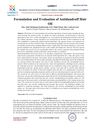 224 citations,
March 2006 in “Seminars in Cutaneous Medicine and Surgery”
224 citations,
March 2006 in “Seminars in Cutaneous Medicine and Surgery” The document concludes that understanding hair follicle biology can lead to better hair loss treatments.
 2 citations,
January 2023 in “BioMed Research International”
2 citations,
January 2023 in “BioMed Research International” Beetroot extract nanogel may help treat hair loss caused by testosterone.
 2 citations,
October 2015 in “Indian journal of science and technology”
2 citations,
October 2015 in “Indian journal of science and technology” SM-215 promotes hair growth by improving the environment around hair follicles.
 3 citations,
January 2012 in “Wageningen Academic Publishers eBooks”
3 citations,
January 2012 in “Wageningen Academic Publishers eBooks” Hair health depends on various factors and hair loss can significantly affect a person's well-being; understanding hair biology is key for creating effective hair care treatments.

IP-PA1 helps grow hair in mice and affects human cell growth-related genes differently than traditional hair growth treatments.
 24 citations,
August 2018 in “Journal of Ayurvedic and herbal medicine”
24 citations,
August 2018 in “Journal of Ayurvedic and herbal medicine” Hibiscus rosa-sinensis may help treat various health issues and promote hair growth, but more research is needed for safety.
 1 citations,
August 2022 in “Molecules”
1 citations,
August 2022 in “Molecules” Prunus mira kernels contain components that can promote hair growth in mice.
 39 citations,
December 2013 in “Phytotherapy Research”
39 citations,
December 2013 in “Phytotherapy Research” Safflower (Carthamus tinctorius) extract helps hair grow and could be used in hair products.
 5 citations,
July 2003 in “Drug Development Research”
5 citations,
July 2003 in “Drug Development Research” Fluridil promotes hair growth safely and effectively for androgenetic alopecia.
 June 2024 in “Molecules/Molecules online/Molecules annual”
June 2024 in “Molecules/Molecules online/Molecules annual” Platycladus orientalis flavonoids protect balding hair from UV damage and slow hair color change.
63 citations,
September 2020 in “Frontiers in Microbiology” Probiotics show promise for health benefits but need more research to understand how they work.
 10 citations,
September 2021 in “International Journal of Nanomedicine”
10 citations,
September 2021 in “International Journal of Nanomedicine” Tiny particles called extracellular vesicles show promise for treating skin conditions and promoting hair growth.
 27 citations,
June 2015 in “Revista Brasileira de Farmacognosia”
27 citations,
June 2015 in “Revista Brasileira de Farmacognosia” Safflower has been used in traditional medicine for centuries and shows promise in treating heart, brain, and inflammatory conditions, but more research is needed to ensure its safety.
 4 citations,
December 2022 in “Frontiers in Bioengineering and Biotechnology”
4 citations,
December 2022 in “Frontiers in Bioengineering and Biotechnology” Exosomes show promise for improving wound healing, reducing aging signs, preventing hair loss, and lightening skin but require more research and better production methods.
 25 citations,
August 2015 in “Journal of cosmetic dermatology”
25 citations,
August 2015 in “Journal of cosmetic dermatology” African American women report more hair issues and use different hair care practices than Caucasian women, and have different hair and scalp characteristics.
 135 citations,
December 2015 in “Expert Opinion on Biological Therapy”
135 citations,
December 2015 in “Expert Opinion on Biological Therapy” Exosomes could potentially enhance tissue repair and regeneration with lower rejection risk and easier production than live cell therapies.
142 citations,
March 2019 in “Molecules/Molecules online/Molecules annual” Cannabinoids may help treat various skin conditions.
 69 citations,
December 2011 in “Journal of Ethnopharmacology”
69 citations,
December 2011 in “Journal of Ethnopharmacology” Some Thai plants, especially Carthamus tinctorius, could help prevent hair loss and promote hair growth without adverse effects.
 3 citations,
January 2021 in “Applied sciences”
3 citations,
January 2021 in “Applied sciences” Fermented red ginseng and a traditional herb mix improved hair growth in mice.
 9 citations,
October 2011 in “Journal of proteomics”
9 citations,
October 2011 in “Journal of proteomics” Taxol damages hair growth cells, causing hair loss.
 14 citations,
April 2018 in “ACS Biomaterials Science & Engineering”
14 citations,
April 2018 in “ACS Biomaterials Science & Engineering” Nanoemulsion is a promising method for delivering luteolin to promote hair growth without minoxidil's side effects.
11 citations,
May 2021 in “Asian Journal of Pharmaceutical and Clinical Research” Eclipta alba (Bhringraj) helps protect the liver and promotes hair growth.
 29 citations,
April 2020 in “Journal of Tissue Engineering and Regenerative Medicine”
29 citations,
April 2020 in “Journal of Tissue Engineering and Regenerative Medicine” The experiment showed that human skin grown in the lab started to form early hair structures when special cell clusters were added.
 5 citations,
November 2022 in “Journal of Ginseng Research/Journal of ginseng research”
5 citations,
November 2022 in “Journal of Ginseng Research/Journal of ginseng research” Ginsenoside Re from Panax ginseng may prevent hair loss by maintaining autophagy and Wnt signaling in hair cells.
 January 2025 in “International Journal of Advanced Research in Science Communication and Technology”
January 2025 in “International Journal of Advanced Research in Science Communication and Technology” The herbal hair oil effectively promotes hair growth, reduces dandruff, and is safe for all hair types.
 67 citations,
February 2020 in “Journal of Ginseng Research”
67 citations,
February 2020 in “Journal of Ginseng Research” Korean Red Ginseng has beneficial components that help with stress, immunity, fatigue, memory, blood flow, and disease protection.
 8 citations,
September 2022 in “Biointerface Research in Applied Chemistry”
8 citations,
September 2022 in “Biointerface Research in Applied Chemistry” Quinoline alkaloids from Cinchona may help treat cancer, diabetes, fungal infections, and promote hair growth.
4 citations,
November 2001 in “PubMed” 1 mg/day oral finasteride significantly improves hair growth in men with male pattern baldness.
 130 citations,
August 2015 in “Experimental Dermatology”
130 citations,
August 2015 in “Experimental Dermatology” Human hair follicle organ culture is a useful model for hair research with potential for studying hair biology and testing treatments.
 July 2023 in “International Journal of Cosmetic Science”
July 2023 in “International Journal of Cosmetic Science” Biopolymers are increasingly used in cosmetics for their non-toxicity and skin benefits, with future biotech advancements likely to expand their applications.


























